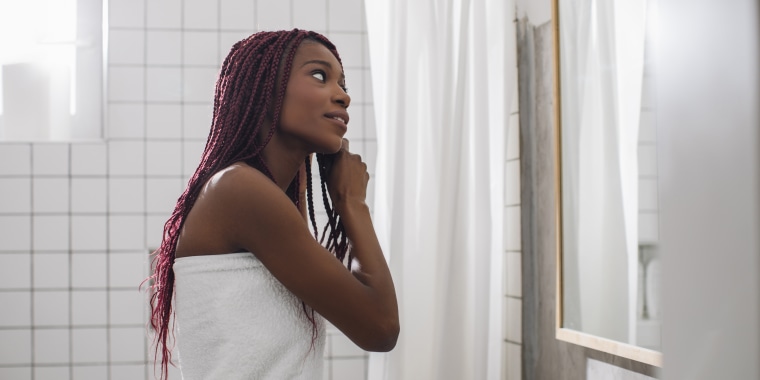No matter how you wash it, dry it, style it, or pamper it, hair is one of our obsessions — and it has remained so throughout the pandemic. When salons were forced to shutter during the lockdown earlier this year, social media was awash with images of people embracing their natural locks, letting their roots grow out, experimenting with home dye jobs and "quaran-cuts." Some newly remote workers even took it as an opportunity to dye their hair bright, bold colors that they wouldn't otherwise have sported at the office. Even celebs like Jennifer Love-Hewitt and Hillary Duff went for some fun new hues.
For a bunch of protein strands covering the tops of our heads, we’re passionate about making this part of our body healthy and strong.
But why? It’s one of the questions Kurt Stenn tackles in his new book, “Hair: A Human History.”
“Hair is so important to the life of people and to an expression of health and who you are, the messages you send,” Stenn told TODAY.
He’s studied hair for more than 30 years, including teaching pathology and dermatology at the Yale University School of Medicine and other schools, and he has .
Here is Stenn's take on frequently asked questions about hair health and how to get healthy hair, as well as his top healthy hair tips.
Can shampoo or other products you apply to hair make it healthy?
Don't count on it.
Lots of shampoos boast they contain vitamins, antioxidants, botanicals and other impressive-sounding ingredients. They can clean your locks, and make them smell and look nice, but don’t expect much more.
“It’s not clear that any of that stuff is having any significant effect on the health of the hair,” Stenn said.
“If it were really having a physiological effect, it would not be a cosmetic product; it would be a pharmaceutical product.”
Remember that a lot of hair product creation is marketing: People are looking for healthy-sounding ingredients in shampoo, so companies add them to be competitive, he noted.
What’s the formula for healthy hair?
It’s pretty simple.
Hair health is determined by the chemicals you put on it, how you treat it and what nutrients your body supplies to the root, Stenn explained.
“The root is you and your health. So if you’re healthy, your hair is going to be healthy,” he said.
“What makes hair healthy are the same things that make the body healthy: good nutrition, lots of water, rest, exercise. All those elements of good body health are reflected in the hair shaft.”
Subjecting your mane to the harsh chemicals used in coloring and perming hair is the most damaging thing you can do to it, Stenn said.
Treating it too roughly — combing or brushing too much, for example — can remove the surface cuticle, he added.
What should I eat to help hair health?
Hair is made almost entirely protein, so it’s important to consume protein, Stenn said. Iron, which is essential for metabolic processes, is also key.
Don’t forget your vitamins and to drink plenty of water.
How do emotions affect hair?
“That is a really, really interesting aspect of hair biology,” Stenn said. “It’s been long recognized that emotional stress affects hair health.”
There’s psychological stress, when you lose a loved one or experience major conflict at work. And there’s bodily stress, which includes pregnancy, major surgery, getting into a car accident or experiencing major blood loss.
In both those types of stresses, hair will react. Why? Because hair grows very rapidly and you need thousands of cells for one strand to grow just a fraction of an inch, Stenn said.
“The hair follicle is very demanding of absolutely perfect conditions, so if conditions change, the hair follicle responds,” he explained.
Stress triggers it to go from a growing to a resting phase. After the rest period, which lasts three months in the case of the human scalp hair follicle, it sheds. That’s why you may see hair falling out three months after you experience a traumatic event.
In the case of pregnancy, the mother’s hormone levels change dramatically when the baby is delivered. The hair follicles sense that, stop growing and rest, Stenn said.
Why is hair important in physical attraction?
The messages hair sends vary from culture to culture, but healthy hair is often associated with positive messages of sexual receptivity and social interaction, Stenn noted.
He’s fascinated by the recent trend of young men shaving their scalps since throughout history, the lack of hair was often a sign of sickness or religious expiation.
Locks can also provide important cues about fertility and social status: Long hair is often associated with young women, for example, and short hair with married women, he said.
“What I’ve always found interesting about hair is that it’s such a noble part of you. You don’t go about touching people’s hair, unless someone invites you,” Stenn observed.
“Hair is just such an important part of the body.”



